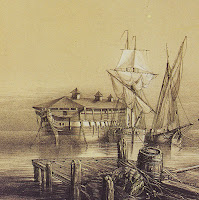One might dismiss this it if McCain's lack of knowledge was about a remote part of the World. But the troubling evidence pertains to the most prominent region of US foreign policy, the Middle East.
We're all aware of McCain being prompted in Jordan by "Whispering Joe" Lieberman who effectively said that, "No John, it's not "common knowldege" that Al-Qaida, radical Sunnis, are receiving training from Shia-oriented Iran, because it's not true."
Oops.
Next is McCain's comment to TIME Magazine's Joe Klein in early 2008 that the southern Iraqi city of Basra is "not a problem," at a time when friends of mine were saying, "Keep an eye on Basra," because it's under control of al-Sader and is a choke point of US supply lines. Then, as many bloggers have reported, Muqtada al-Sadr showed the Iraqi central government who's in charge in Basra when his militia stood up to the central government's attempted crack down leaving the Arizona senator "surprised."
Oops again.
Then, what about this major pillar of McCain's foreign policy platform known as the "League of Democracies"? The Star Tribune (via L.A. Times) reports:
Only days after laying out his foreign policy agenda, Sen. John McCain has begun scaling back a key proposal that had been greeted with alarm by some Republican supporters and wariness by important U.S. allies.
Oops on foreign policy again.
Then, as reported in the New York Times, there was McCain's proposal to kick Russia out of the Group of 8 (G-8) nations that meet on economic and other foreign policy matters. One of many problems with McCain's naive idea is that the G-8 makes decisions by consensus, so no single nation can eject another. Besides making himself look, "just dumb," as one senior US official on Russian policy put it, McCain risks creating friction with Russia with nothing to gain from it. [More]
Oooops!
McCain's flip-flop on banning torture can be viewed as another foreign policy blunder. The bottom line is that McCain caved to Bush, as he told Chris Mathews of MSNBC:
I think you do understand that there are some people who are very, very bad people, and I think that to continue a program for some of them, without torture, is something that we can't deprive the President of the United States of.
Philip Giraldi explains McCain's slight-of-hand, which is understood among foreign policy circles and by other nations, even if the "average American" doesn't know it:
But the catch was that President Bush made clear his interpretation of the legislation in a signing statement, reserving what he described as his presidential constitutional authority to avoid further terrorist attacks, which would include the use of torture if necessary. McCain knew perfectly well that he had surrendered on the issue but did not object, feeling that he had occupied the moral high ground and picked up the favorable headlines while preserving the president's authority to carry out "enhanced interrogations."
Doh!
In another exchange with Joe Klien, McCain revealed that he doesn't understand that Iran's president Ahmadinejad is basically a loose cannon figure head. The real decision-making power lies with Supreme Leader Ali Khamenei. When Joe Klien called McCain on this McCain said,
the fact is he's the acknowledged leader of that country and uh you may disagree, but that's, that's a uh that's your right to do so, but I think if you ask any average American who the leader is, I think they'd know.
Oops yet again.
.
Ilan Goldenberg of the National Security Network, who does have some foreing policy expertise, clarifies who runs Iran:
at the top of it sits Supreme Leader Ayatollah Ali Khamenei, who essentially has only accountable to the Council of Guardians made up of clerics, many of whom are appointed by Khamenei. So, Ahmadinejad is not the leader. And as the Council on Foreign Relations explains, especially in the area of foreign policy, Ahmadinejad has very little influence.
It seems that McCain's reliance on "common knowledge" and the uninformed average American reflects his true level of foreign policy expertise. To understand the source of McCain's misguided perception, we merely need to read CNN Wolf Blitzer's May 21, 2008 blog entry:
there is no doubt that McCain’s strategy of hammering Obama on a nearly daily basis on foreign policy is deliberate. McCain certainly feels very comfortable talking about national security. He sees that as his major strength. And most observers agree McCain would much rather have national security on the agenda right now than the economy where he and his fellow Republicans see themselves as rather vulnerable..

















